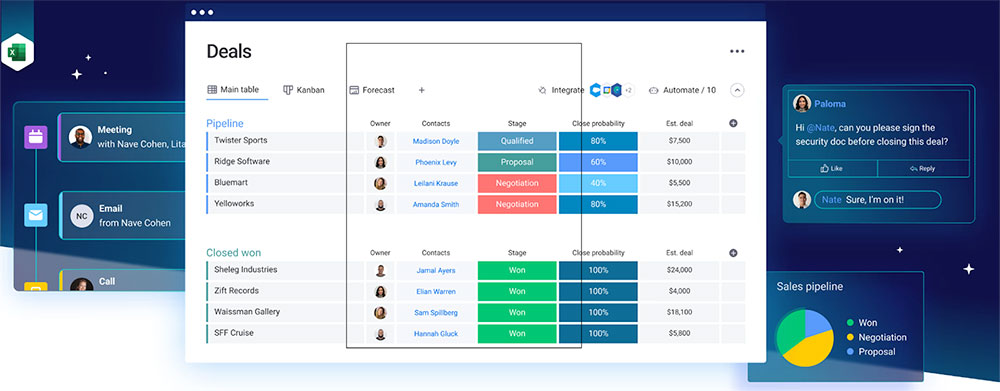Monday.com, a developer of work OS management tools, on Tuesday released the first of five new standalone products aimed at professionals with targeted use cases.
This new customer relationship management tool set is a substantial shift from the all-in-one product strategy the company employed until now. The new platform, Monday Sales CRM, is built on the company’s flexible low-code/no-code framework and is a fully customizable tool that can be implemented within minutes.
This proprietary CRM platform lets business owners and sales teams of any size manage all aspects of their sales cycle and customer data in one centralized place. It integrates with hundreds of apps and services, including Salesforce, HubSpot, Slack, Aircall, Mailchimp, PandaDoc, and DocuSign to unlock data silos and offer a unified solution.
The integration automatically connects sales teams to finance, account management, legal, and customer service functions for easy organizational collaboration. The other four new products will support a variety of teams working in sales, marketing, software development, and project management.
“As organizations’ digitization continues to evolve rapidly, the need for a unified cross-department customer view becomes more pressing. We’re building a CRM that is fast, flexible, and breaks down departmental silos to connect teams across entire organizations, which increases efficiency and results,” said the Monday Sales CRM product lead, Ron Kimhi.
The new approach to CRM is unified but also very easy to use, he asserted, ensuring a seamless journey from prospect to customer and beyond, optimizing daily teamwork, team satisfaction, and success.
Feature Set
The new platform helps users automate tedious tasks and save time, according to Monday. It also lets individual team members customize the tools to suit team workflows.
Integration with Gmail and Outlook lets workers sync email within the platform. It provides automatic logging and tracking, including notifications when a lead opens or replies to an email.
Monday Sales CRM | Image Credit: Monday.com
Team Goals are kept on target. The platform helps to manage quota attainment over time, track wins, and view goals for specific members or the entire team.
The post sales management feature keeps activities in one place to help stay on top of client onboarding, client projects, and collection tracking. The sales operations tool is used to plan and fast-track the sales hiring process and equip sales teams with tools and resources to help close more deals.
Silo Buster
Monday Sales CRM does more than provide tools for sales leads and deals. The product also offers a comprehensive and flexible database for the entire customer journey.
Once a deal is won, Monday Sales CRM immediately creates a new account for client onboarding, providing account representatives with the data related to a specific account. This workflow helps to enable a smooth transition from prospective customers to confirmed accounts.
Automations allow customer data to sync across departments so companies can operate efficiently, with no dedicated administrator.
Monday saw a need to meet the continuing rapid growth of businesses digitally evolving. That realization motivated the creation of a platform for a CRM product that goes beyond the initial sales journey.
“We built the Monday Sales CRM to break down departmental silos and allow teams of all sizes and industries to easily and efficiently connect across the entire customer journey, from the first sales call all the way through to confirmed accounts,” Kimhi told CRM Buyer.
That way, once the sales team closes a new deal, the finance and account management teams are immediately brought in to continue managing the customer lifecycle, he added.
Solved In-House Needs
Monday Sales CRM was built from an internal pain point from the company’s consultancy department. Resolving that issue was the genesis for taking the platform to market.
“As a small to medium-sized team, they felt that there was not a customizable CRM out there that provided the capabilities and flexibility they needed at the right price,” offered Kimhi.
Building the new platform allowed the sales teams to manage their sales operations more efficiently and with less rigidity. It gave them a space to compile all onboarding, tracking, and sales collateral to help them sell.
Allowing teams to get up and running within minutes, with no administrator, no dedicated teammate, or coding knowledge, gave much-needed time and resources back to sales teams, he detailed.
Its customizable structure and flexibility provided teams with the insight, context, data, and analytics from the first inbound call throughout post-sale processes and beyond sales operations.
Today, that platform seamlessly connects to the entire Work OS, so companies can operate openly and transparently with all data and information in a central location.
Notable Presence
The New York and Israel-based company launched in 2014.
Its Work OS platform connects people to processes and systems, which, according to Monday, provides two benefits: It empowers teams to excel in every aspect of their work, and creates an environment of transparency in business.
“The platform is used by over 152,000 customers across over 200 industries in 195 countries. It is appealing to such a large base of customers because it is so fast, flexible, and accessible for anyone looking to maximize their sales efforts,” said Kimhi.
Instead of having to onboard an administrator, the team can customize the platform to its needs and those of a specific sales funnel.
Whether it be organizing customer details to keep track of the customer journey, the low-code/no-code platform lets users choose the most efficient way to set up their system and efficiently work with their team — inside the sales department and beyond, he explained.
Programming Trend of the Future
Kimhi sees low-code/no-code gaining enough momentum to be on track to partially replace developer-written apps in the CRM industry. Companies of all kinds are adopting low-code/no-code to improve their business processes.
“We see this trend very clearly at Monday.com, where 70% of our customers operate outside the technology industry. It is awesome that we are at a place where technology is not a barrier to better work, but instead now an easy tool to maximize efficiency and productivity, ultimately making teams more agile and flexible,” offered Kimhi.
In today’s employment climate, studies show that research and development teams are always busy. Companies are nearly always looking to hire developers and engineers, Kimhi noted.
“With low-code/no-code, teammates from any department can use this technology without needing to rely on already sparse resources, giving them the power to take full control of their work rather than waiting on developers to make changes,” he added.
But while low-code/no-code provides relief to these development teams; Monday does not see it acting as a full replacement. At the end of the day, it can solve a lot of use cases, but companies will always need traditional coding for those more nuanced, deeper CRM cases.
“Rather than fully replacing developer written apps, low-code/no-code simply enables more teammates across any department to use coding in a fast, flexible and agile way to maximize their work processes,” Kimhi concluded.
Pricing
Monday Sales CRM is available in a variety of tiers aimed to serve sales teams big and small.
An individual package, with up to two seats and 1,000 contacts, is free.
Paid plans have a 3-seat minimum and are billed annually:
- Basic CRM, which is $10 per seat, provides unlimited customizable pipelines, unlimited contacts, unlimited boards and more.
- Standard CRM is $14 per seat. It includes custom CRM automations and integrations, ultimately automating sales processes and streamlining communication.
- Pro CRM for $24 per seat provides sales forecasting, email tracking and automations, sales analytics, and combined dashboards.
An Enterprise version is also available. See all plans at Monday.com.


























































